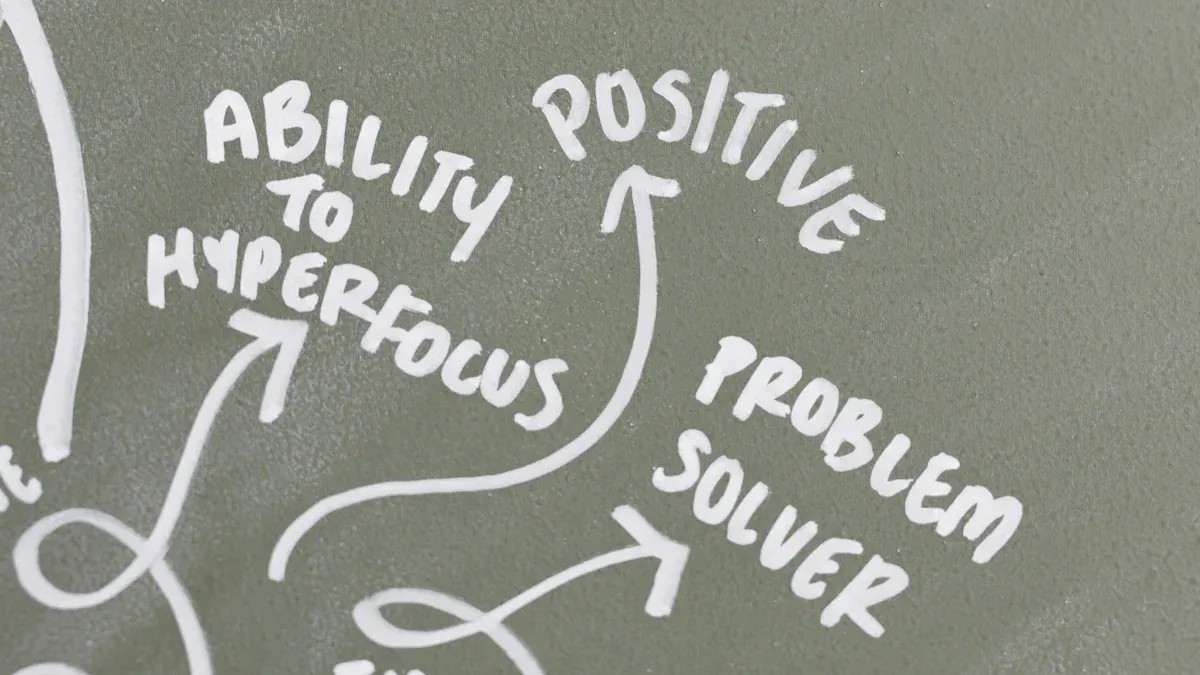Last updated on October 21st, 2025 at 12:26 pm
You may feel hurt or confused when you see the Narcissist New Supply. Your mind might compare you to them and wonder what you lacked. These feelings are normal.
Remember, your worth does not depend on someone else’s choice. You did not cause the narcissist’s behavior. Their actions reflect their own patterns, not your value.
Key Takeaways
Your worth does not depend on who the narcissist dates. Focus on what makes you valuable.
Narcissists pick new partners because their needs change. It is not because you are missing something.
Do not compare yourself to the Narcissist New Supply. Their choice shows their own problems, not your value.
Narcissists want partners who make them look better. They do not look for real connection.
Grooming happens slowly. Narcissists build trust so they can control their partners. Watch out for this trick.
The idealization phase feels strong but is not true love. Narcissists use it to control your feelings.
Narcissistic relationships go through love-bombing, devaluation, and discard. Learn to see this pattern.
It’s Not About You
Narcissist’s Needs
You might ask why the narcissist picked someone else. The reason is not about your qualities or your worth. Narcissists choose new partners because their needs change. They do not look for someone better than you. They want someone who fits what they want right now.
Narcissists often feel empty inside. They look for partners to fill this emptiness.
They like people who are independent. These partners seem confident and strong, which the narcissist likes at first.
Narcissists see strong partners as a challenge. They want to control and dominate, not admire these traits.
They do not care about the person’s true self. They only care about what the partner can give them.
Tip: The Narcissist New Supply was not picked because you were missing something. The narcissist wants someone who matches their needs at that time.
You might see narcissists move from one relationship to another fast. They do not make deep connections. Their choices show their own emotional problems, not yours.
Here is a table that shows how narcissists’ needs change over time:
Aspect | Evidence |
|---|---|
Vulnerable Narcissism | This affects how narcissists connect with partners. |
Narcissists switch between wanting closeness and avoiding commitment. | |
Relationship Dynamics | Different types of narcissism change how relationships work. |
Commitment Levels | Narcissists often show low commitment. |
Infidelity | Narcissists cheat more often. |
Relationship Duration | Narcissists usually have short relationships. |
The Illusion of Comparison
You might compare yourself to the Narcissist New Supply. This can feel painful and unfair. It is important to know this feeling comes from how narcissists see their partners.
Narcissists see partners as part of themselves. They do not notice their partner’s special qualities.
They do not have much empathy. They blame others for problems and do not take responsibility.
Narcissists use praise for themselves. They mix their identity with their partner’s, which makes a fake sense of unity.
This illusion helps them avoid their own fears of rejection or being left alone.
Note: Comparing yourself to the new supply is not helpful. The narcissist’s choice is not about you. It is about their own needs and ways of coping.
You might think the new relationship looks perfect. In truth, narcissists move on quickly because they do not bond deeply. The new relationship seems better only because it is new and has no fights yet. Over time, the same problems will happen again.
Key Points to Remember:
The narcissist’s choices show their own needs, not your worth.
The illusion of comparison comes from how the narcissist sees partners, not from reality.
You are not to blame for the narcissist’s actions or choices.
Narcissist New Supply: What They Seek

Traits Targeted
You might wonder why the Narcissist New Supply was picked. Narcissists do not choose partners for love or real connection. They want traits that make them feel special and strong.
Narcissists like partners with high status. These people help the narcissist look good.
They want “trophy” partners. This means someone who stands out and gets attention.
Relationships that help their image are more important than real support.
Tip: The Narcissist New Supply may have traits that match the narcissist’s need for status, not traits for a healthy relationship.
Grooming Process
Narcissists use grooming to get new partners. This helps them gain trust and control. You might notice these steps if you think about your own past.
Narcissists act charming and give lots of compliments.
They give gifts and pay attention to you. This makes you feel wanted.
Sometimes, they tell big stories or change facts about their past. This changes how you see them.
Their goal is to make you feel like you must keep the relationship strong.
Gaslighting can happen during grooming. Narcissists may say your feelings are wrong or make you doubt yourself. After a while, you might feel confused and unsure about what is true.
Note: Grooming does not happen fast. It can take weeks or months. It slowly changes how you see yourself and the relationship.
Idealization Phase
After grooming, the idealization phase starts. This phase feels exciting and intense. The narcissist gives you lots of praise and affection. You may feel like you are the most important person to them.
Characteristic | Description |
|---|---|
You get many compliments and gifts. You feel happy and special. | |
Love Bombing | The narcissist gives you constant attention and affection. |
Mirroring | They copy your interests and actions. This makes you feel understood. |
Idealization | The narcissist puts you on a pedestal. You seem perfect to them. |
Emotional Manipulation | The mix of praise and attention makes you depend on their approval. |
During this phase, you may feel chosen and special. The Narcissist New Supply feels the same way. This phase is not real love. It is a way for the narcissist to make you care more.
Callout: Many people think the Narcissist New Supply “had” something you did not. Really, the narcissist does the same thing with every partner. Studies show narcissists want status and control, not real connection. Experts like Dr. Ramani Durvasula say both overt and covert narcissists use these tricks. The cycle is about their needs, not your worth.
Key Points:
Narcissists pick traits that help their image.
Grooming builds trust and control slowly.
The idealization phase makes strong emotional bonds, but it is not real love.
The Narcissist New Supply is not better or more worthy. The cycle happens with every partner.
Relationship Cycles

Narcissistic relationships have a pattern that repeats. You might see the same steps with each partner, even with the Narcissist New Supply. This pattern has three main stages: love-bombing, devaluation, and discard.
Love-Bombing
At first, you get lots of attention and care. The narcissist acts like you are the most important person. You get many compliments, gifts, and messages. Big gestures make you feel close to them. You might feel amazed by their actions.
Common signs of love-bombing:
Too much affection and praise
Lots of texts and calls
Fancy gifts and surprises
Huge statements about love
Victims often feel special and happy in this stage. The strong feelings can make you easy to control later.
Many people say they feel chosen and unique. This stage makes you depend on the narcissist. They use this bond to take control.
Devaluation
After some time, the excitement goes away. The narcissist starts to point out your mistakes. You may notice more fights and less kindness. The narcissist uses tricks to keep power over you. You might feel confused and unsure about what is real.
Typical behaviors during devaluation:
Blaming and criticizing often
Pulling away and acting cold
Gaslighting to make you doubt yourself
Keeping you away from friends and family
Making you feel less confident
The devaluation stage brings sadness and worry. You may feel nervous, down, and not good enough. Many people feel stuck and unsafe.
This stage can cause constant worry. You might try hard to please the narcissist. You may ignore your own needs. The mix of praise and blame creates a strong, unhealthy bond.
Discard
When the narcissist thinks you are not useful, the discard stage starts. This stage can happen fast. The narcissist stops caring and may act mean or ignore you. You see changes in how they act and look.
Signs the narcissist is preparing to discard:
More blaming and breaking rules
Not caring and acting distant
Spending time with someone else
Making you feel less happy
Talking about ending things
Many people feel surprised and hurt in the discard stage. You may feel unsure and sad. Help from friends or therapy can make you feel better.
You can deal with this by learning about narcissistic personality disorder. Set boundaries and take care of yourself. The discard stage is hard, but it can help you start to heal.
Stage | Description |
|---|---|
Idealization | The narcissist gives you lots of love and attention to make a bond. |
Devaluation | The narcissist starts to blame and criticize you after feeling safe. |
Discard | The narcissist ends things quickly when you are not useful. |
Hoover | The narcissist may try to come back to control you again. |
The cycle happens again with new partners, even with the Narcissist New Supply. This pattern comes from the narcissist’s need for control and praise.
Fate of Narcissist New Supply
Same Patterns Repeat
You might think the Narcissist New Supply will have a better time. But narcissists act the same way with every partner. Their relationships start with excitement and romance. Soon, they begin to control and trick their partners. Narcissists often want their partners to change small things. They may keep their partners away from friends and family. After a while, they treat their partners like objects, not people.
Narcissists start out very romantic, but then get controlling.
They want partners to change little things about themselves.
They often make partners spend less time with others.
When problems come up, narcissists treat partners badly and look for someone new.
You may hope the new supply will avoid these problems, but the cycle always happens again. The Narcissist New Supply will face the same bad treatment you did.
Initial Treatment vs. Reality
At first, narcissists treat new partners very well. They give big gifts and say nice things all the time. This feels amazing, but it does not last long. Soon, the perfect act starts to fall apart. The narcissist begins to complain and act distant. The relationship goes from fun to sad.
Evolving Reality Over Time | |
|---|---|
They make things seem perfect and special | The perfect act breaks, and people feel let down |
They act like their partner is the best | They start to blame and put down their partner |
Partners feel safe for a short time | Partners feel more alone and upset as time goes on |
The Narcissist New Supply may feel important at first, but soon the truth shows. The same pattern of being praised and then blamed happens again.
Emotional Impact
When the truth comes out, new partners often feel hurt. They may react to old pain from past relationships. Many people need comfort because they feel unsure. Trust can become a problem, even if there is no real reason.
They often ask for comfort because they feel nervous.
Trust problems can start, and people may worry about cheating.
The feelings can be very strong. You might feel lost and not know what is true. It is hard to understand what happened because of mixed messages. You feel both loved and put down, which is confusing.
Trouble understanding what is real
Feeling both loved and hurt
Getting better takes time. You can help yourself by making rules and getting help. Talking to a therapist can help you heal. Taking care of yourself and having good friends is important.
Take care of yourself and focus on feeling better.
Stay close to friends and family who support you.
Write down what happens to remember things clearly.
Conclusion
The narcissist’s choices do not decide who you are. If you compare yourself to the new supply, it will only slow your healing. Try to pay attention to getting better and growing as a person.
Therapy can help you learn about your feelings and become stronger.
Doing self-care like working out or writing in a journal helps you feel better inside.
When you start setting boundaries, you keep yourself safe and make better relationships.
Always remember, your worth comes from inside you. You should be treated with respect and care. 🌱
Transform your Inner Chaos into authentic personal growth!
Stay informed on the latest research advancements covering:
Co-Parenting With A Narcissist
Frequently Asked Questions
What is a “narcissist new supply”?
A narcissist new supply is the person a narcissist starts dating or focusing on after you. The narcissist uses this person to get attention, praise, or control. This new supply is not better than you.
Will the narcissist treat the new supply better?
At first, the narcissist may act loving and kind. Over time, the same unhealthy patterns repeat. The new supply will likely face the same problems you did.
Did I do something wrong to be replaced?
You did nothing wrong. Narcissists change partners because of their own needs. Their actions do not reflect your value or worth.
Can the new supply change the narcissist?
No one can change a narcissist unless the narcissist wants to change. Most narcissists do not see a problem with their behavior. The cycle usually repeats.
Why does the new relationship look perfect online?
Narcissists often show off their new relationships on social media. They want others to think everything is perfect. This is part of their image, not the real story.
How can I stop comparing myself to the new supply?
Remind yourself that the narcissist’s choices do not define you. Focus on your healing and growth. Spend time with people who support you.
Is it normal to feel jealous or hurt?
Yes, these feelings are normal. Many people feel sad, angry, or jealous after seeing a narcissist with someone new. Give yourself time to heal.
What should I do if the narcissist tries to come back?
Set clear boundaries. Protect your well-being. You deserve respect and care. If you feel unsure, talk to a trusted friend or therapist.
